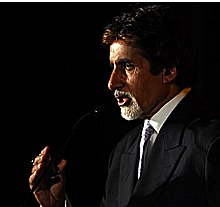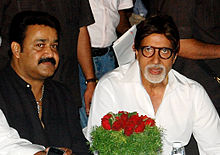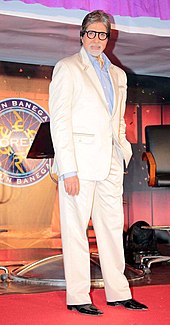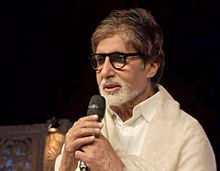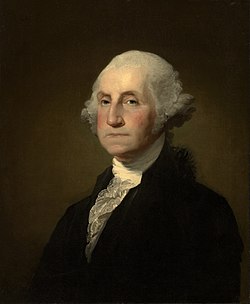Amitabh Harivansh Bachchan (IPA: [əmɪˈtaːbʱ ˈbəttʃən]; born 11 October 1942) is an Indian film actor. He first gained popularity in the early 1970s for movies like Zanjeer and Deewar, and was dubbed India's first "angry young man" for his on-screen roles inBollywood. Referred to as the "Shahenshah of Bollywood", "Star of the Millennium" or "Big B",[3][4][5][6] he has since appeared in over 180 Indian films in a career spanning more than four decades.[7][8] Bachchan is widely regarded as one of the greatest and most influential actors in the history of Indian cinema.[9][10][11][12][13] So total was his dominance of the movie scene in the 1970s and 1980s that the French director François Truffaut called him a "one-man industry."[14][15]
Bachchan has won numerous accolades in his career, including four National Film Awards as Best Actor and many awards at international film festivals and award ceremonies. He has won fifteen Filmfare Awards and is the most-nominated performer in any major acting category at Filmfare, with 40 nominations overall. In addition to acting, Bachchan has worked as a playback singer, film producer and television presenter. He also had a stint in politics in the 1980s.
| Amitabh Bachchan | |
|---|---|

Bachchan in 2013 TeachAIDS interview
| |
| Born | Amitabh Harivansh Rai Bachchan 11 October 1942 Allahabad, United Provinces, British India |
| Residence | Prateeksha, Mumbai, Maharashtra, India |
| Nationality | Indian |
| Alma mater | Sherwood College, Nainital Kirori Mal College, Delhi University[1] |
| Occupation | Actor, producer, singer, television presenter |
| Years active | 1969–present |
| Religion | Hinduism |
| Spouse(s) | Jaya Bhaduri (m. 1973) |
| Children |
|
| Parent(s) | Harivansh Rai Bachchan Teji Bachchan |
| Relatives | Ajitabh Bachchan (brother) Aishwarya Rai Bachchan(daughter-in-law) |
| Awards | |
| Signature | |
 | |
The Government of India honoured him with the Padma Shri in 1984, the Padma Bhushan in 2001 and the Padma Vibhushan in 2015 for his contributions to the arts.[16] The Government of France honoured him with its highest civilian honour, Knight of theLegion of Honour, in 2007 for his exceptional career in the world of cinema and beyond.[17]
Bachchan made his Hollywood debut in 2013 with The Great Gatsby, in which he played a non-Indian Jewish character, Meyer Wolfsheim.
Career
Early work: 1969–1972
Bachchan made his film debut in 1969 as a voice narrator in Mrinal Sen's National Award winning film Bhuvan Shome.[25] His first acting role was as one of the seven protagonists in the film Saat Hindustani directed by Khwaja Ahmad Abbas and featuring Utpal Dutt, Anwar Ali (brother of comedian Mehmood), Madhu and Jalal Agha.[26][27]
Anand (1971) followed, in which Bachchan starred alongside Rajesh Khanna. His role as a doctor with a cynical view of life garnered Bachchan his first Filmfare Best Supporting Actor award. He then played his first antagonist role as an infatuated lover-turned-murderer in Parwaana (1971). Following Parwaana were several films including Reshma Aur Shera (1971). During this time, he made a guest appearance in the film Guddi which starred his future wife Jaya Bhaduri. He narrated part of the film Bawarchi. In 1972 he made an appearance in the road action comedy Bombay to Goa directed by S. Ramanathan. Many of Bachchan's films during this early period did not do well, but that was about to change.[28]
Rise to stardom: 1973–1983
Director Prakash Mehra cast him in the leading role for the film Zanjeer (1973) as Inspector Vijay Khanna. The film was a sharp contrast to the romantically themed films that had generally preceded it and established Amitabh in a new persona—the "angry young man" of Bollywood cinema.[8] Filmfare considers this one of the most iconic performances of Bollywood history.[28] The film was a huge success and one of the highest grossing films of that year, breaking Bachchan's dry spell at the box office and making him a star.[29] From then onwards, Bachchan became one of the most successful leading men of the film industry. He earned his first Filmfare nomination for Best Actor for Zanjeer. The year 1973 was also when he married Jaya, and around this time they appeared in several films together; not only in Zanjeer but in films such as Abhimaan which followed and was released only a month after their marriage and was also successful at the box office. Later, Bachchan played the role of Vikram, once again along with Rajesh Khanna, in the film Namak Haraam, a social drama directed by Hrishikesh Mukherjee and scripted by Biresh Chatterjee addressing themes of friendship. His supporting role won him his second Filmfare Best Supporting Actor award.
In 1974, Bachchan made several guest appearances in films such as Kunwara Baap and Dost, before playing a supporting role in Roti Kapda Aur Makaan. The film, directed and written by Manoj Kumar, addressed themes of honesty in the face of oppression and financial and emotional hardship and was the top earning film of 1974. Bachchan then played the leading role in film Majboor, released on 6 December 1974, which was a remake of the Hollywood film Zig Zag. The film was a success at the box office.[30] In 1975, he starred in a variety of film genres from the comedyChupke Chupke, the crime drama Faraar to the romantic drama Mili. 1975 was also the year when Bachchan appeared in two films regarded as important in Hindi cinema history. He starred in the Yash Chopra directed film Deewaar along with Shashi Kapoor, Nirupa Roy, and Neetu Singh, earning him a Filmfare nomination for Best Actor. The film became a major hit at the box office in 1975, ranking in at number 4.[31] Indiatimes Movies ranks Deewaar amongst the Top 25 Must See Bollywood Films.[32] Released on 15 August 1975 was Sholay, which became the highest grossing film of 1975 and also of all time in India, earning INR 2,364,500,000 equivalent to US$60 million, after adjusting for inflation.[33] in which Bachchan played the role of Jaidev. In 1999, BBC India declared it the "Film of the Millennium" and like Deewar, has been cited by Indiatimes movies as amongst the Top 25 Must See Bollywood Films.[32] In that same year, the judges of the 50th annual Filmfare Awards awarded it with the special distinction award called Filmfare Best Film of 50 Years.
In 1976, he was cast by Yash Chopra in the romantic family drama Kabhie Kabhie. Bachchan starred as a young poet named Amit Malhotra who falls deeply in love with a beautiful young girl named Pooja (Raakhee) who ends up marrying someone else (Shashi Kapoor). The film was notable for portraying Bachchan as a romantic hero, a far cry from his "angry young man" roles like Zanjeer and Deewar. The film evoked a favourable response from critics and audiences alike. Bachchan was again nominated for the Filmfare Best Actor Award for his role in the film. That same year he played a double role in Adalat as father and son. In 1977, he won his first Filmfare Best Actor Award for his performance in Amar Akbar Anthony where he played the third lead opposite Vinod Khanna and Rishi Kapoor as Anthony Gonsalves. The film was the highest grossing film of that year. His other successes that year include Parvarish and Khoon Pasina.[34] He once again resumed double roles in films such as Kasme Vaade (1978) as Amit and Shankar and Don (1978) playing the characters of Don, a leader of an underworld gang and his look alike Vijay. His performance won him his second Filmfare Best Actor Award. He also gave towering performances in Yash Chopra's Trishul and Prakash Mehra's Muqaddar Ka Sikandar both of which earned him further Filmfare Best Actor nominations.
In 1979, Bachchan starred in Suhaag which was the highest earning film of that year. In the same year he also enjoyed critical acclaim and commercial success with films like Mr. Natwarlal, Kaala Patthar and The Great Gambler. Amitabh was required to use his singing voice for the first time in a song from the film Mr. Natwarlal in which he starred withRekha. Bachchan's performance in the film saw him nominated for both the Filmfare Best Actor Award and the Filmfare Award for Best Male Playback Singer. He also received Best Actor nomination for Kaala Patthar and then went on to be nominated again in 1980 for the Raj Khosla directed film Dostana, in which he starred opposite Shatrughan Sinhaand Zeenat Aman. Dostana proved to be the top grossing film of 1980.[35] In 1981, he starred in Yash Chopra's melodrama film Silsila, where he starred alongside his wife Jaya and Rekha. Other films of this period like Shaan (1980), Shakti (1982) which pitted him against the veteran actor Dilip Kumar were not successful at the box office but Ram Balram (1980), Naseeb (1981) and Lawaaris (1981) were successful.[36]
In 1982 he played double roles in the films Satte Pe Satta and Desh Premee which succeeded at the box office.[37] In 1983 he played a triple role in Mahaan and starred in the top grossing film of that year Coolie.[38]
1982 injury while filming Coolie
On 26 July 1982, while filming Coolie in the University Campus in Bangalore, Bachchan suffered a near fatal intestinal injury during the filming of a fight scene with co-actorPuneet Issar.[39] Bachchan was performing his own stunts in the film and one scene required him to fall onto a table and then on the ground. However, as he jumped towards the table, the corner of the table struck his abdomen, resulting in a splenic rupture from which he lost a significant amount of blood. He required an emergency splenectomy and remained critically ill in hospital for many months, at times close to death. The public response included prayers in temples and offers to sacrifice limbs to save him, while later, there were long queues of well-wishing fans outside the hospital where he was recuperating.[40]
Nevertheless, he resumed filming later that year after a long period of recuperation. The film was released in 1983, and partly due to the huge publicity of Bachchan's accident, the film was a box office success and the top grossing film that year.[41]
The director, Manmohan Desai, altered the ending of Coolie after Bachchan's accident. Bachchan's character was originally intended to have been killed off but after the change of script, the character lived in the end. It would have been inappropriate, said Desai, for the man who had just fended off death in real life to be killed on screen. Also, in the released film the footage of the fight scene is frozen at the critical moment, and a caption appears onscreen marking this as the instant of the actor's injury and the ensuing publicity of the accident.[42]
Later, he was diagnosed with Myasthenia gravis. His illness made him feel weak both mentally and physically and he decided to quit films and venture into politics. At this time he became pessimistic, expressing concern with how a new film would be received and stated before every release, "Yeh film to flop hogi!" ("This film will flop").[43]
Politics: 1984–87
In 1984, Bachchan took a break from acting and briefly entered politics in support of long-time family friend, Rajiv Gandhi. He contested Allahabad's seat of 8th Lok Sabhaagainst H. N. Bahuguna, former Chief Minister of Uttar Pradesh and won by one of the highest victory margins in general election history (68.2% of the vote).[44] His political career, however, was short-lived: he resigned after three years, calling politics a cesspool. The resignation followed the implication of Bachchan and his brother in the "Bofors scandal" by a newspaper, which he vowed to take to court. Bachchan was eventually found not guilty of involvement in the ordeal.[45]
His old friend, Amar Singh, helped him during a financial crisis due to the failure of his company ABCL. Therefore, Bachchan started to support Amar Singh's political party, theSamajwadi Party. Jaya Bachchan joined the Samajwadi party and became a Rajya Sabha member.[46] Bachchan has continued to do favours for the Samajwadi party, including advertisements and political campaigns. These activities have recently gotten him into trouble in the Indian courts for false claims after a previous incident of submission of legal papers by him, stating that he is a farmer.[47]
A 15-year press ban against Bachchan was imposed during his peak acting years by Stardust and some of the other film magazines. In his defence, Bachchan claimed to have banned the press from entering his sets until late 1989.[48]
Slump and retirement: 1988–1992
In 1988, Bachchan returned to films, playing the title role in Shahenshah, which was a box office success.[49] After the success of his comeback film however, his star power began to wane as all of his subsequent films like Jaadugar, Toofan and Main Azaad Hoon (all released in 1989) failed at the box office. The 1991 hit film, Hum, for which he won his third Filmfare Best Actor Award, looked like it might reverse the trend, but this momentum was short-lived and his string of box office failures continued. Notably, despite the lack of hits, it was during this era that Bachchan won his first National Film Award for Best Actor for his performance as a Mafia don in the 1990 film Agneepath. These years would see his last on-screen appearances for some time. After the release of Khuda Gawah in 1992, Bachchan went into semi-retirement for five years. With the exception of the delayed release of Insaniyat (1994), which was also a box office failure, Bachchan did not appear in any new releases for five years.[50]
Producer and acting comeback 1996–99
Bachchan turned producer during his temporary retirement period, setting up Amitabh Bachchan Corporation, Ltd. (ABCL) in 1996, with a vision of becoming a 10 billion rupees (approx. U.S. $250 M) premier entertainment company by the year 2000.[citation needed] ABCL's strategy was to introduce products and services covering an entire cross-section of India's entertainment industry. ABCL's operations were mainstream commercial film production and distribution, audio cassettes and video discs, production and marketing of television software, and celebrity and event management.[citation needed] Soon after the company was launched in 1996, the first film it produced was Tere Mere Sapne, which did not fare well at the boxoffice but launched the careers of actors like Arshad Warsi and South films star Simran.[citation needed] ABCL produced a few other films, none of which did well.[citation needed]
In 1997, Bachchan attempted to make his acting comeback with the film Mrityudata, produced by ABCL. Though Mrityudaata attempted to reprise Bachchan's earlier success as an action hero, the film was a failure both financially and critically.[citation needed] ABCL was the main sponsor of the 1996 Miss World beauty pageant, Bangalore but lost millions. The fiasco and the consequent legal battles surrounding ABCL and various entities after the event, coupled with the fact that ABCL was reported to have overpaid most of its top level managers, eventually led to its financial and operational collapse in 1997. The company went into administration and was later declared a failed company by Indian Industries board.[citation needed] The Bombay high court, in April 1999, restrained Bachchan from selling off his Bombay bungalow 'Prateeksha' and two flats till the pending loan recovery cases of Canara Bank were disposed of. Bachchan had, however, pleaded that he had mortgaged his bungalow to raise funds for his company.[51]
Bachchan attempted to revive his acting career and had average success with Bade Miyan Chote Miyan (1998),[50] and received positive reviews for Sooryavansham (1999)[52]but other films such as Lal Baadshah (1999) and Hindustan Ki Kasam (1999) were box office failures.
Return to prominence: 2000–present
In 2000, Amitabh Bachchan appeared in Yash Chopra's box-office hit, Mohabbatein, directed by Aditya Chopra. He played a stern, older figure that rivalled the character of Shahrukh Khan. His role won him his third Filmfare Best Supporting Actor Award. Other hits followed, with Bachchan appearing as an older family patriarch in Ek Rishtaa: The Bond of Love (2001), Kabhi Khushi Kabhie Gham... (2001) andBaghban (2003). As an actor, he continued to perform in a range of characters, receiving critical praise for his performances in Aks(2001), Aankhen (2002), Khakee (2004) and Dev (2004). His performance in Aks won him his first Filmfare Critics Award for Best Actor. One project that did particularly well for Bachchan was Sanjay Leela Bhansali's Black (2005). The film starred Bachchan as an ageing teacher of a deaf-blind girl and followed their relationship. His performance was unanimously praised by critics and audiences and won him his second National Film Award for Best Actor, his fourth Filmfare Best Actor Award and his second Filmfare Critics Award for Best Actor. Taking advantage of this resurgence, Amitabh began endorsing a variety of products and services, appearing in many television and billboard advertisements. In 2005 and 2006, he starred with his son Abhishek in the hit films Bunty Aur Babli (2005), the Godfathertribute Sarkar (2005), and Kabhi Alvida Naa Kehna (2006). All of them were successful at the box office.[53][54] His later releases in 2006 and early 2007 were Baabul (2006),[55] Ekalavya and Nishabd (2007), which failed to do well at the box office but his performances in each of them were praised by critics.[56]
In May 2007, two of his films Cheeni Kum and the multi-starrer Shootout at Lokhandwala were released. Shootout at Lokhandwala did well at the box office and was declared a semi-hit in India, while Cheeni Kum picked up after a slow start and only had average success.[57] A remake of his biggest hit, Sholay (1975), entitled Ram Gopal Varma Ki Aag, released in August of that same year and proved to be a major commercial failure in addition to its poor critical reception.[57] The year also marked Bachchan's first appearance in an English-language film, Rituparno Ghosh's The Last Lear, co-starring Arjun Rampal and Preity Zinta. The film premiered at the 2007 Toronto International Film Festival on 9 September 2007. He received positive reviews from critics who hailed his performance as his best ever since Black.[58] Bachchan was slated to play a supporting role in his first international film, Shantaram, directed by Mira Nair and starring Hollywood actor Johnny Depp in the lead. The film was due to begin filming in February 2008 but due to the writer's strike, was pushed to September 2008.[59] The film is currently "shelved" indefinitely.[60] Vivek Sharma's Bhoothnath, in which he plays the title role as a ghost, was released on 9 May 2008. Sarkar Raj, the sequel of the 2005 film Sarkar, released in June 2008 and received a positive response at the box-office. Paa, which released at the end of 2009 was a highly anticipated project as it saw him playing his own son Abhishek's Progeria-affected 13-year-old son, and it opened to favourable reviews, particularly towards Bachchan's performance. It won him his third National Film Award for Best Actor and fifth Filmfare Best Actor Award. In 2010, he debuted in Malayalam film throughKandahar, directed by Major Ravi and co-starring Mohanlal.[61] The film was based on the hijacking incident of the Indian Airlines Flight 814.[62] Bachchan declined any remuneration for this film.[63] In 2013 he made his Hollywood debut in The Great Gatsby making a special appearance opposite Leonardo DiCaprio and Tobey Maguire. In 2014, he played the role of the friendly ghost in the sequel Bhoothnath Returns. The next year, he played the role of a grumpy father suffering from chronic constipation in Piku. It won him his fourth National Film Award for Best Actor and his third Filmfare Critics Award for Best Actor.
Television career
In 2000, Bachchan hosted the first season of Kaun Banega Crorepati (KBC), the Indian adaptation of the British television game show, Who Wants to Be a Millionaire?. The show was well received.[64] A second season followed in 2005 but its run was cut short by STAR Plus when Bachchan fell ill in 2006.[65]
In 2010, Bachchan hosted the fourth season of KBC.[67] The fifth season started on 15 August 2011 and ended on 17 November 2011. The show became a massive hit with audiences and broke many TRP Records. CNN IBN awarded Indian of the Year- Entertainment to Team KBC and Bachchan. The Show also grabbed all the major Awards for its category.[citation needed]
The sixth season was also hosted by Bachchan, commencing on 7 September 2012, broadcast on Sony TV and received the highest number of viewers thus far.[68]
In 2014, he debuted in the fictional Sony Entertainment Television TV series titled Yudh playing the lead role of a businessman battling both his personal and professional life.[69]
Bachchan is also the brand ambassador for Gujarat Tourism, which he has been since 1 February 2010.
Voice
Bachchan is known for his deep, baritone voice. He has been a narrator, a playback singer, and presenter for numerous programmes.[70][71][72]Renowned film director Satyajit Ray was so impressed with Bachchan's voice that he decided to use Bachchan as the narrator in his 1977 filmShatranj Ke Khilari (The Chess Players).[73] Bachchan lent his voice as a narrator to the 2001 movie Lagaan which was a super hit.[74] In 2005, Bachchan lent his voice to the Oscar-winning French documentary March of the Penguins, directed by Luc Jacquet.[75]
He also done voice over work for the following movies:
- Balika Badhu (1975)
- Tere Mere Sapne (1996)
- Lagaan (2001)
- Parineeta (2005)
- Jodhaa Akbar (2008)
- Swami (2007)[76]
- Zor Lagaa Ke...Haiya! (2009)
- Kahaani (2012)
- Krrish 3 (2013)
- Mahabharat (2013)
- Kochadaiiyaan (Hindi Version) (2014)
Humanitarian causes
Amitabh Bachchan has been involved in many social works. Amitabh donated ₹11 lakh (US$16,000) to clear the debts of nearly 40 beleaguered farmers in Andhra Pradesh.[77]He also donated ₹30 lakh (US$45,000) to clear the debts of some 100 Vidarbha farmers.[78] In 2010, he donated ₹11 lakh (US$16,000) for Resul Pookutty's foundation, for medical centre at Kochi.[79][80][81] Amitabh Bachchan donated ₹2.5 lakh (US$3,700) to Delhi Police constable Subhash Chand Tomar's family, who died after succumbing to injuries during anti-gangrape protest for 2012 Delhi gang rape.[82][83] He opened a Harivansh Rai Bachchan Memorial Trust, or HRB Memorial Trust in his father's name in 2013.[84] Amitabh Bachchan was made UNICEF goodwill ambassador for polio Eradication Campaign in India in 2002, when 1,556 polio cases were detected that year .[85][86][87]On 27 March 2014, World Health Organization (WHO) declared India a polio free country with no case of disease being reported in the previous three years.[88][89][90] In 2013, Amitabh and his family donated ₹25 lakh (US$37,000) to charitable trust Plan India, that works for the upliftment of the girl child in India.[91][92][93] Amitabh Bachchan donated₹11 lakh (US$16,000) to Maharashtra Police Welfare Fund in 2013.[94] Amitabh was the face of 'Save Our Tigers' campaign that promoted the importance of tiger conservation in India.[95]
Amitabh also supported PETA India's campaign to free, Sunder, a 14-year-old elephant who was chained and tortured in a temple in Kolhapur, Maharashtra.[96][97] After the elephant was freed and rehabilitated in Bannerghatta National Park in Bangalore, he was reported to tweet, "@PetaIndia has turned elephant Sunder’s home into free-roaming, forested sanctuary... feeling good I contributed to this cause !"[98]
In 2014, it was announced that he had recorded his voice and lent his image to the Hindi and English language versions of the TeachAIDS software, an international HIV/AIDSprevention education tool developed at Stanford University.[99]
Business investments
Amitabh Bachchan has invested in many upcoming business ventures. In 2013, he bought a 10% stake in Just Dial from which he made a gain of 4600 percent. He holds a 3.4% equity in Stampede Capital, a financial technology firm specializing in cloud computing for financial markets. The Bachchan family also bought shares worth $252,000 in Meridian Tech, a consulting company in U.S. Recently they made their first overseas investment in Ziddu.com, a cloud based content distribution platform.[100]
The actor's name was reportedly mentioned in the Panama Papers that contained details of secret offshore accounts [101]
Awards, honours and recognitions
Apart from National Film Awards, Filmfare Awards and other competitive awards which Bachchan won for his performances throughout the years, he has been awarded several honours for his achievements in the Indian film industry. In 1991, he became the first artist to receive the Filmfare Lifetime Achievement Award, which was established in the name of Raj Kapoor. Bachchan was crowned as Superstar of the Millennium in 2000 at the Filmfare Awards.
In 1999, Bachchan was voted the "greatest star of stage or screen" in a BBC Your Millennium online poll. The organisation noted that "Many people in the western world will not have heard of [him] ... [but it] is a reflection of the huge popularity of Indian films."[102] In 2001, he was honoured with the Actor of the Century award at the Alexandria International Film Festival in Egypt in recognition of his contribution to the world of cinema.[103] Many other honours for his achievements were conferred upon him at several International Film Festivals, including the Lifetime Achievement Award at the 2010 Asian Film Awards.[104]
In June 2000, he became the first living Asian to have been modeled in wax at London's Madame Tussauds Wax Museum.[105] Another statue was installed in New York in 2009,[106] Hong Kong in 2011,[107] Bangkok in 2011[108] and Washington, DC in 2012.[109]
- Civilian Awards
The Government of India awarded him with the Padma Shri in 1984, the Padma Bhushan in 2001 and the Padma Vibhushan in 2015. France's highest civilian honour, the Knight of the Legion of Honour, was conferred upon him by the French Government in 2007 for his "exceptional career in the world of cinema and beyond".[111]
Honoured with an Honorary Doctorate
- In 2004, by the University of Jhansi, India,[112]
- In 2006, by the University of Delhi[113]
- In 2006, by the De Montfort University in Leicester, UK[114]
- In 2007, by the Leeds Metropolitan University in Yorkshire, UK[115]
- In 2011, by the Queensland University of Technology in Brisbane, Australia[116]
- In 2013, by the Jodhpur National University[117][118]
- In 2015, by the Academy of Arts (Egypt) in Cairo, Egypt[119][120]
On 27 July 2012, Bachchan carried the Olympic torch during the last leg of its relay in London's Southwark.[121]
Severals books have been written about Bachchan. Amitabh Bachchan: the Legend was published in 1999,[122] To be or not to be: Amitabh Bachchan in 2004,[123] AB: The Legend (A Photographer's Tribute) in 2006,[124] Amitabh Bachchan: Ek Jeevit Kimvadanti in 2006,[125] Amitabh: The Making of a Superstar in 2006,[126] Looking for the Big B: Bollywood, Bachchan and Me in 2007[127] andBachchanalia in 2009.[128]
Bachchan himself wrote a book in 2002: Soul Curry for you and me – An Empowering Philosophy That Can Enrich Your Life.[129] In the early 80s, Bachchan authorised the use of his likeness for the comic book character Supremo in a series titled The Adventures of Amitabh Bachchan.[130] In May 2014, La Trobe University in Australia named a Scholarship after Bachchan.[131]
He was named "Hottest Vegetarian" by PETA India in 2012.[132] He won the title of "Asia's Sexiest Vegetarian" in a contest poll run by PETA Asia[133]
Selected filmography
Main article: Amitabh Bachchan filmography
| Year | Film | Role | Notes |
|---|---|---|---|
| 1971 | Anand | Dr. Bhaskar Bannerjee (Babu Moshai) | Filmfare Award for Best Supporting Actor |
| 1973 | Namak Haraam | Vikram (Vicky) | Filmfare Award for Best Supporting Actor |
| 1977 | Amar Akbar Anthony | Anthony Gonsalves | Filmfare Award for Best Actor |
| 1978 | Don | Don/ Vijay | Filmfare Award for Best Actor |
| 1990 | Agneepath | Vijay Deenanath Chauhan | National Film Award for Best Actor |
| 1991 | Hum | Tiger / Shekhar | Filmfare Award for Best Actor |
| 2000 | Mohabbatein | Narayan Shankar | Filmfare Award for Best Supporting Actor |
| 2001 | Aks | Manu Verma | Filmfare Critics Award for Best Actor |
| 2005 | Black | Debraj Sahani | National Film Award for Best Actor Filmfare Award for Best Actor Filmfare Critics Award for Best Actor |
| 2009 | Paa | Auro | National Film Award for Best Actor Filmfare Award for Best Actor |
| 2015 | Piku | Bhashkor Banerjee | National Film Award for Best Actor Filmfare Critics Award for Best Actor |

